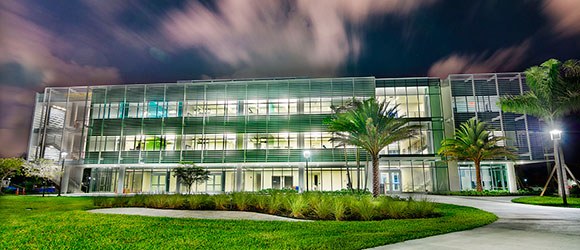You have /5 articles left.
Sign up for a free account or log in.
 Each installment of "Spotlight on Innovation" from "Inside Digital Learning" focuses on an institution with under-the-radar efforts around classroom experiences enabled or enhanced by digital technology. If you think your institution belongs in this series, email mark.lieberman@insidehighered.com.
Each installment of "Spotlight on Innovation" from "Inside Digital Learning" focuses on an institution with under-the-radar efforts around classroom experiences enabled or enhanced by digital technology. If you think your institution belongs in this series, email mark.lieberman@insidehighered.com.
Institution: Unity College, a private liberal arts college in Maine that offers undergraduate and graduate degrees in sustainability science.
Enrollment: 773 students, including 71 online.
The Lay of the Land: Many institutions venture into online education to try to reverse a trend of declining enrollment. Unity is different. Having endured enrollment declines throughout the ’00s, the college “doubled down on its residential experience” with new student success coaches and upgraded facilities around 2013. Those efforts managed to increase enrollment from 500 to 750 students within a few years, according to Melik Peter Khoury, the college's president.
About three years ago, college administrators established a strategic unit to investigate the potential value of offering online programs. The idea came about after a flurry of requests from alums from the institution’s 50-year history who wanted more education.
The institution also identified professors at other institutions with “distinct expertise” who seemed like a match for Unity’s offerings but would not have wanted to relocate to Unity’s remote campus.
Thus the foray into online began. The first degree program, a master’s of professional science in sustainable natural resource management and sustainability science, launched in October 2016 with 20 students. It was followed the next year with an online “sustainable M.B.A.” and three additional master’s programs.
“Many institutions offer this suite of generic business courses,” Khoury said. “This is really embedded into the sustainability concept of economy, humanity and the environment and really lends itself to those who want to work in what I’m calling the environmental century.”
The institution measures online enrollment in credit hours to account for part-time and non-degree-seeking students. The program's first year, with 20 students, had 453 credit hours, far more than the university's goal of 359, according to Amy Arnett, Unity’s chief distance education officer. Year two saw a jump to 1,098 credit hours, and this upcoming year, Unity projects more than 2,000 online credit hours -- 400 more than its goal.
This fall, the institution is also launching four undergraduate degrees: wildlife conservation, sustainable business management, environmental studies and environmental criminal justice.
Starting With Enthusiasm: Institutions often run into trouble when faculty members are reluctant to abandon their tried-and-true teaching methods. Khoury took a different approach. His team established a separate distance education division staffed by instructors and technicians with demonstrated interest in online education. Rather than forcing instructors who remain wedded to the face-to-face model, he created a distinct culture driven by faculty and staff members who wanted to strive for distance education innovation.
Every instructor and staff member who volunteered to join the institution’s online efforts had his or her position “backfilled” with full-time replacements, according to Khoury.
“We had to bifurcate the campus to allow for one initiative to not overlap with another,” Khoury said. “The idea is we are changing the operating model to audience first, instead of ‘This is what we teach; this is how we teach it.’”
Khoury’s team identified departments of the institution that would need to play a role in the development of online programs, including information technology and human resources. Then he “created a firewall between the two,” according to Arnett. The online team now includes an enrollment manager; concierges for recruitment, retention and advising; and an instructional technologist.
A strong faculty presence in the online unit keeps the focus on student needs, Khoury said. Arnett was a professor for 18 years.
“We had people coming to work focusing 100 percent on creating processes, procedures, learning platforms, how the curriculum was going to be rolled out, how we’re going to enroll/recruit/retain these online students,” Arnett said. “I wasn’t also a professor saying I’m going to teach online. I am now 100 percent dedicated.”
Previously in "Spotlight on Innovation"
Muhlenberg College finds its online niche within the liberal arts.
Coastline Community College sees professional development as key to expanding online presence.
Campbellsville University grew its online programs at a faster rate than expected.
Every morning the online team meets for an hour to hear reports on billing, financial aid, marketing and student success. The meeting helps prevent individual staff members from getting trapped in their silos, according to Arnett.
“We had to carve out time where we’re not allowed to talk about flagship students,” Arnett said.
Pulling It Off: The budget for the new programs was built around a five-year financial plan with at least half a million dollars invested per year, according to Khoury. The viability of the online programs didn’t hinge upon their success after 12 months. The institution also invested $1.5 million in technology hardware and $1.5 million in software.
"We knew we had to diversify our students," Khoury said. "We decided not to go on the cheap."
The biggest pedagogical challenge, Arnett said, was reminding faculty members not to overwhelm their students with too much content too quickly.
“They wanted to create 100-page PowerPoints and I won’t let ’em. It’s boring,” Arnett said. “I’m trying to get them to think out of the box.”
Arnett developed a syllabus template that all online instructors modify for their courses. She plays a “hands-on” role in course development, alongside an instructional designer, who provides one-on-one support to faculty members.
According to Arnett, the institution has partnerships with a marketing company that helps with search engine optimization and with MindMax, an Austin, Tex.-based company that helps find and recruit new students. On the academic side, the team consulted eight to 10 experts in each field of study to understand the consensus on job skills that are particularly essential in the current market, Arnett said.
What’s Next: The institution isn’t done innovating, according to Khoury. Certifications and trainings will become increasingly essential as the higher ed landscape continues to fragment, and Khoury hopes to invest in virtual reality and 3-D printing to enhance classroom and online experiences.
A joke within the Unity College community laments that it can take decades for Unity's traditional students to achieve their full career potential after graduating, thanks to the challenges of the job market in this field. Khoury and his team hope online programs will serve an adult audience that's already attained some influence in the field.
From his position outside the major mainstream online innovators, Khoury sees innovation in higher ed as an uphill battle.
“Stop everything that you’re doing -- we now need to do everything that you’ve always done and add an entirely new way of teaching to a completely different audience who is not what you’re used to,” Khoury said. “We wonder why we struggle.”
Unity's solution, for now, is to stay true to its niche and move forward with a spirit of experimentation.
“We’re really not thinking of ourselves just as online,” Arnett said. “Even though our bread and butter is these degree programs, I want education to be accessible to everybody.”




